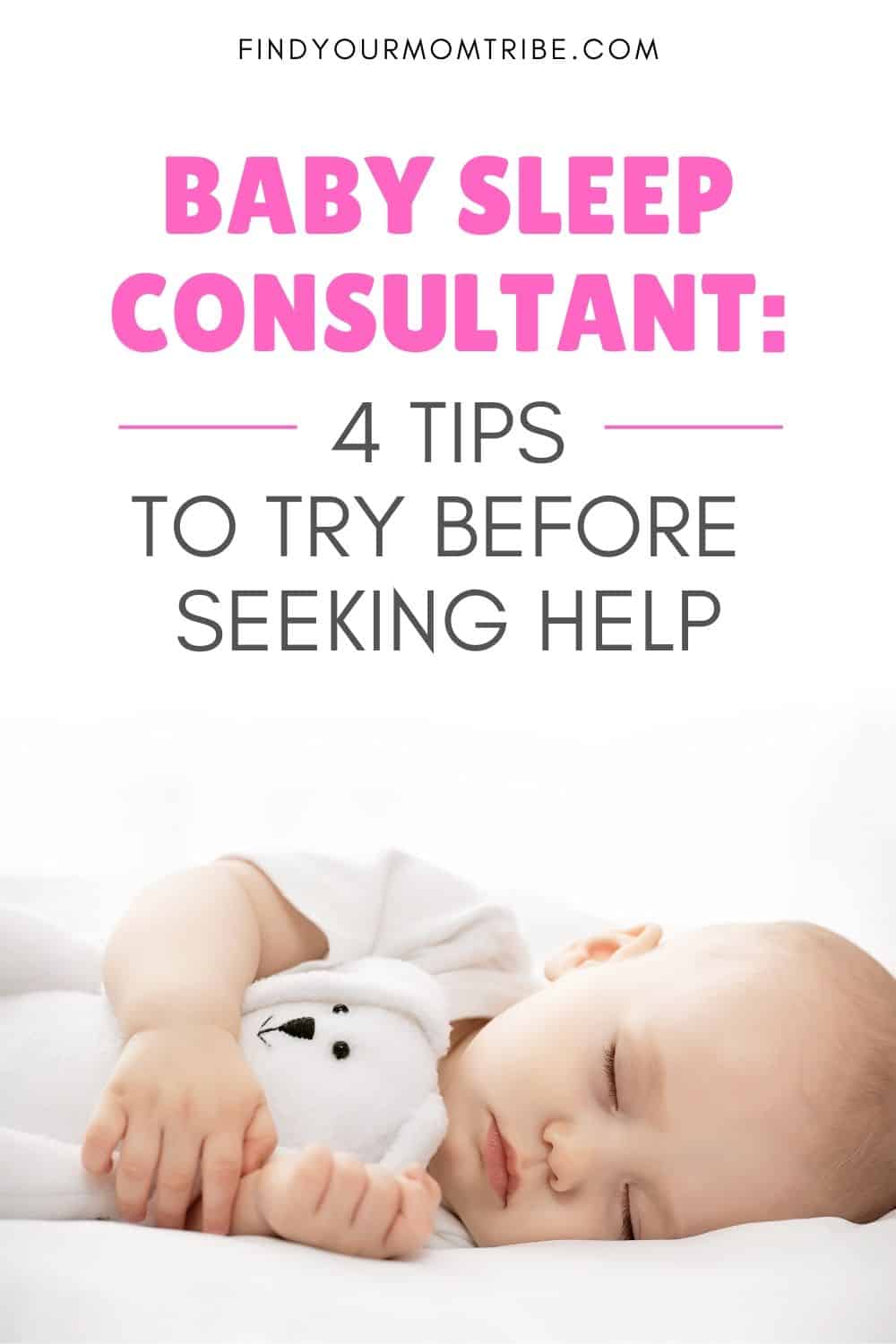As you usher in a new child into the world and become a mom for the first, second, or even the fifth time, you soon come to terms with the weight of responsibility added to your shoulders (usually about 7-10 pounds, depending on the baby!).
Jokes aside, taking care of a child and its needs will make a mess of the schedule you’ve had prior to having a newborn.
One of the most important ones that’s proven to be a challenge (with or without a baby sleep consultant) is the dreaded sleep training.
Nap time is a fearsome beast to take on because it’s not just teaching the baby sleep on his own, but making sure you don’t start suffering from sleep deprivation on your own.
As a mom of two, I can tell you that it doesn’t get any easier because each baby is different, but hiring a baby sleep consultant might help reduce your sleepless nights to a minimum.
That said, child sleep consultants can get quite pricey, so don’t go looking for one just because of a few nights of irregular sleep.
Use some guidelines I have assembled in this article and consult with other moms on some sleep tips in order to get your whole family back on track with healthy sleep habits.
When to start sleep training
It is well known that babies sleep a lot on a daily basis, especially after being fed or huddling in the warmth of their mother and listening to the beating of her heart.
From what I’ve found from personal experience, a healthy amount of sleep for your little ones is between 11 to 19 hours.
But if it doesn’t fit between those numbers, don’t start panicking outright, losing your own sleep, looking for a sleep coach online, or otherwise.
Every child has different habits – different amounts of time they need for a good night’s rest.
Another thing to note is that you shouldn’t bother starting off with sleep training as soon as you get home.
Infants younger than 4 months won’t really take to it since they have an erratic and often instinctual way of doing things.
They’re used to being inside your tummy and not being there anymore takes some getting used to.
The usual recommendation seems to be between 4-6 months of age, but even if they’re over a year old, it’s never too late to start working on your baby’s sleep routine, so don’t fret over it too much.

I was a panic-heavy mom, thinking every single thing that wasn’t up to par in the psychological parts of my little one’s habits was a danger sign (and I was hopeless when it came to baby products).
Babies tend to imitate the behavior of their parents and the people around them, so all I did was make both her and my hubby unnecessarily nervous.
So once I was pointed out to this fact and given some handy tips from fellow moms, I made sure to ease up and trust my baby to be able to put herself back to sleep with only some occasional assistance by me.
But enough of my testimonials, at least for now.
There are a variety of sleep training methods you can employ based on your parenting style with the help of experienced moms and even your family pediatrician.
I urge you to try them out and see if they work for you before seeking the aid of a sleep trainer.
Self-made sleep coach
One might say that successfully making your toddler sleep on a schedule is a science on its own, and this is true, but not in the traditional sense.
Some moms do it by instinct. I was not one of them, but here are the tips I had received that helped me fix that.

1. Remove distractions from the sleep environment
When designating the nursery for your little one, make sure that they feel comfortable and safe, without adding any distractions.
Many parents believe that toys and mobiles will calm down the baby so they could sleep better but that is not true.
It you want your bundle of joy to sleep well, make sure to make space around the crib without adding any unnecessary distractions.
Babies can feel where they can sleep and where they can play.
Always separate those two spaces so your little one could get a good night sleep and on the other hand, a fun time playing in a space designed only for that.
Also, always make sure you properly dressed your baby for sleep, and that they’re not too hot or too cold.

2. Consistency is key
When trying to get your baby used to one form of sleep plan, stick to it.
As they grow older, kids become creatures of habit and having a sleep routine that is consistent helps them adjust to it.
Don’t swap the routine out if it doesn’t work the first time around. This is a mistake nearly every new parent makes.
No matter how tiring it gets, stick it out, unless you’re doing something fundamentally wrong, which we will get to.

3. Don’t smother the baby with attention
The most common technique a sleep expert will recommend is leaving your baby alone to sleep after he has been set down into his crib.
Don’t run to his aid as soon as the baby monitor lights up and you hear him cry because he happened to wake up earlier than expected.
Leave him alone for a bit and see if he calms himself down and puts himself back to sleep.
Making him fall back on you for every little whim will cause a whole number of other problems later.
This is something I am guilty of because I’m a worrywart through and through, but I’ve managed to get better at it with time.

Yes, there is nothing worse than hearing your own baby cry and it’s as gut-wrenching as it gets, but the key is to suck it up sometimes because you will not be around to aid your child for his entire life.
4. Don’t let them just cry it out
While what I said in number 2 stands, there are certain extremes we don’t go to, especially concerning our little ones.
That extreme is leaving them crying for hours on end without care because we’re adamant that this method of letting them do it on their own will work.
The technique itself doesn’t mean completely ignore them.
You should still come in and comfort them or put their pacifier back in their mouth to help them go back to sleep quicker.
Pace yourself if anything.
Slowly start toning down the attention you provide during this time until they don’t even need you to come in for them to go back to one of their short naps in a series of many.

5. Your well-being is as important as your baby’s
While you have to make some sacrifices during motherhood, don’t go so far as to start getting some serious health issues just so your baby can get some sleep.
It is not good for any member of the family, especially when mom is the one suffering.
Make sure to find some time for yourself, ease up, relax a bit. Understand that you are not the only one that needs to be on call.
Take it from me. I panicked when I had my first child and I had nervous breakdowns nearly 3-4 times a week.
The levels of stress are already high enough without you thinking that you need to be a martyr for the child more than you already are; it only adds more anxiety to the pile.
Your husband (or wife) is always there for you, and even then if it’s too much, don’t shy away from hiring a nanny or asking the help of relatives (thank you, Nana!) to help you loosen your tight schedule up.

Knowing when you’re out of your depth
It’s not a crime to admit that you might be in over your head and that it might be time to get a baby sleep consultant.
New parents can find a lot of things concerning parenthood overwhelming, on top of their already existing schedules.
Nowadays, a household often needs two members of the family working full-time to support it and that often doesn’t leave time for you to devote to the baby, let alone yourself.
Sleep consulting is nothing to be ashamed of; it exists to help you reduce your load and point out any mistakes you might be making along the way.
Think of it as a sort of therapy, a way of preserving your sanity, and as I’ve said earlier, better sleep for you is just as important as it is for your baby.
And sometimes you have to pay a professional to help you achieve it.

Before you enlist help, always ask the consultant about how they operate, what their ways of achieving good sleep for the baby (and yourself) are.
They should typically tell you this free of charge so you can gauge whether or not their sleep solutions are the right ones for you.
Now, don’t expect a sleep coach to monitor your baby 24 hours a day.
They don’t normally do their work in-home (though given the prices of some, they may as well be a butler!)
No, the way sleep coaching works is, well, coaching for you more than it is for your baby.
They will ask you about your little one’s habits, if they have any health problems that might impede their sleep, and similar questions.
Once everything is laid out on the table, they will give you their form of professional advice on what you can do to help your child develop healthy sleep habits.
Again, some advice may seem harsh and cold, but it is more often than not, right.
If you follow it through and adapt to it as you track the progress of your baby’s sleep training with them, you won’t need them after a few sessions and will be fully capable of handling it on your own.
What we’ve learned
In the end, a baby sleep consultant is quite pricey and is recommended only if you can pay for them and if it’s the last viable option, especially in a world of increasingly demanding child-care expenses.
Take time to re-read the article when necessary, Google a specific problem, and consult with other moms locally or on social media, especially ones with experience in handling sleep training.

Learn from them, but also make sure to accept the fact that what worked for someone else’s child might not work for your own.
Every baby is different and that’s what makes them so special and dear to our hearts.
As always, I hope this little article has helped you in your everyday life as a mom, whether financially or mentally, and that the whole family, especially your children, are all the happier for it.
READ NEXT:
- Face Down – Should My Baby Sleep In That Position?
- Toddler Sleep Regression: What Is It And How To Overcome It
Like this post? Please share or pin it for later. You can also stay in the loop and follow us on Facebook, Instagram or Pinterest.

This post contains affiliate links. Please see our full disclosure for more info.

